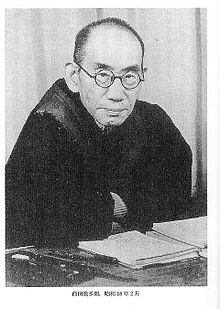Nishida Kitarō
| Kitarō Nishida | |
|---|---|
 |
|
| Born | May 19, 1870 Unokema, Ishikawa, Japan |
| Died | June 7, 1945 (aged 75) Kamakura, Kanagawa, Japan |
| Alma mater | University of Tokyo |
| Era | 20th-century philosophy |
| Region | Japanese philosophy |
| School | Kyoto School |
| Institutions | University of Kyoto |
|
Main interests
|
Zen Buddhism, Moral philosophy |
|
Notable ideas
|
Logic of Basho (non-dualistic concrete logic), Absolute Nothingness |
|
Influences
|
|
|
Influenced
|
|
Kitarō Nishida (西田 幾多郎 Nishida Kitarō?, May 19, 1870 – June 7, 1945) was a prominent Japanese philosopher, founder of what has been called the Kyoto School of philosophy. He graduated from the University of Tokyo during the Meiji period in 1894 with a degree in philosophy. He was named professor of the Fourth Higher School in Ishikawa Prefecture in 1899 and later became professor of philosophy at Kyoto University. Nishida retired in 1927. In 1940, he was awarded the Order of Culture (文化勲章, bunka kunshō). He participated in establishing the Chiba Institute of Technology (千葉工業大学) from 1940. Nishida Kitarō died at the age of 75 of a renal infection. His grave is at Reiun'in (霊雲院, Reiun'in), a temple in the Myōshin-ji compound in Kyoto.
Being born in the third year of the Meiji period, Nishida was presented with a new, unique opportunity to contemplate Eastern philosophical issues in the fresh light that Western philosophy shone on them. Nishida's original and creative philosophy, incorporating ideas of Zen and Western philosophy, was aimed at bringing the East and West closer. Throughout his lifetime, Nishida published a number of books and essays including An Inquiry into the Good and "The Logic of the Place of Nothingness and the Religious Worldview." Taken as a whole, Nishida’s life work was the foundation for the Kyoto School of philosophy and the inspiration for the original thinking of his disciples.
...
Wikipedia
